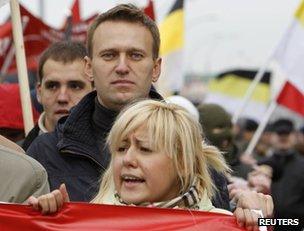Moscow nationalist rally hears attack on Putin party
- Published

Alexei Navalny (middle of picture) is one of Russia's most popular bloggers
An annual rally of radical nationalists in Moscow has cheered a fierce condemnation of the ruling party by a leading anti-corruption campaigner.
Alexei Navalny, one of Russia's most popular bloggers, told a crowd of some 7,000 that United Russia was "the party of crooks and thieves".
Speaking to reporters, he defended his attendance at an event where racist slogans were chanted by the crowd.
He said the rally was an outlet for anger at the government.
It was held on Russia's National Unity Day, a public holiday introduced in 2005 to replace the Soviet celebration of the 1917 Russian Revolution.
The gathering was sanctioned by the authorities but confined to a district on the outskirts of the Russian capital, Lyublino.
Russia holds parliamentary and presidential elections over the next five months which Prime Minister Vladimir Putin and his allies are widely expected to win.
'Taboo' problems
Marchers brandished Russian imperial flags
"This is our country, and we have to eradicate the crooks who suck our blood and eat our liver," Mr Navalny, a lawyer, yelled to the cheering crowd.
"Down with United Russia! Down with the party of crooks and thieves!"
Speaking to Reuters, he said the Russian March was a chance to "discuss problems which really exist in the society but which are taboo and are never discussed in the parliament, on television or anywhere else".
"We have problems with illegal migration, we have the problem of the Caucasus, we have a problem of ethnic crimes...," he said.
"The fact that our authorities hypocritically pretend that such problems do not exist leads to people discussing them only in the street, at the Russian March."
The Moscow rally, which was one of a series held in Russian cities on Friday, also heard racist slogans attacking non-Russians, particularly from the Caucasus region, and speeches from far-right figures.
A smaller "anti-fascist" rally was also in Moscow in protest at the "Russian March".
Large rallies by United Russia and the pro-Kremlin Nashi youth movement were also held in the capital to mark the holiday.
- Published2 November 2011
- Published6 March 2012